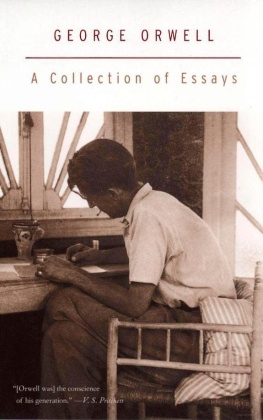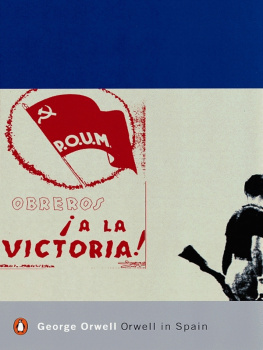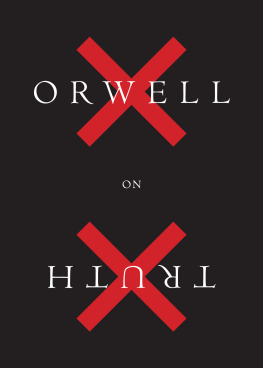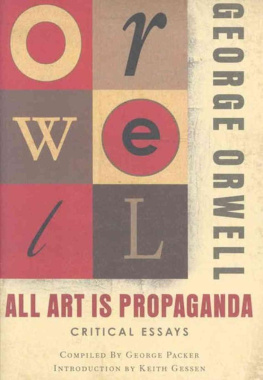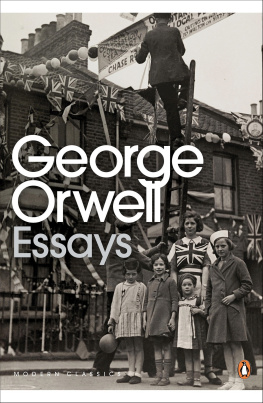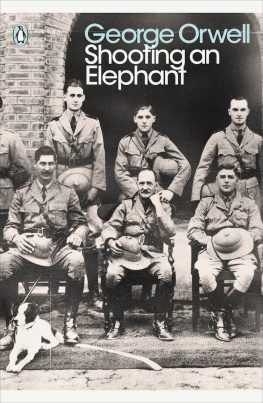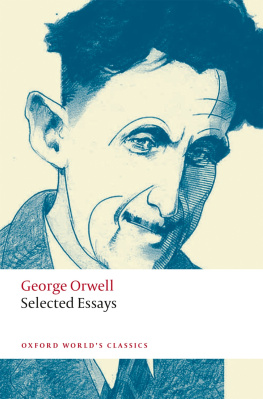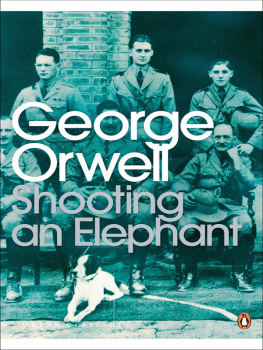George Orwell - A Collection of Essays
Here you can read online George Orwell - A Collection of Essays full text of the book (entire story) in english for free. Download pdf and epub, get meaning, cover and reviews about this ebook. year: 2011, genre: Art. Description of the work, (preface) as well as reviews are available. Best literature library LitArk.com created for fans of good reading and offers a wide selection of genres:
Romance novel
Science fiction
Adventure
Detective
Science
History
Home and family
Prose
Art
Politics
Computer
Non-fiction
Religion
Business
Children
Humor
Choose a favorite category and find really read worthwhile books. Enjoy immersion in the world of imagination, feel the emotions of the characters or learn something new for yourself, make an fascinating discovery.
- Book:A Collection of Essays
- Author:
- Genre:
- Year:2011
- Rating:3 / 5
- Favourites:Add to favourites
- Your mark:
- 60
- 1
- 2
- 3
- 4
- 5
A Collection of Essays: summary, description and annotation
We offer to read an annotation, description, summary or preface (depends on what the author of the book "A Collection of Essays" wrote himself). If you haven't found the necessary information about the book — write in the comments, we will try to find it.
A Collection of Essays — read online for free the complete book (whole text) full work
Below is the text of the book, divided by pages. System saving the place of the last page read, allows you to conveniently read the book "A Collection of Essays" online for free, without having to search again every time where you left off. Put a bookmark, and you can go to the page where you finished reading at any time.
Font size:
Interval:
Bookmark:
S oon after I arrived at St Cyprian's (not immediately, but after a week or two, just when I seemed to be settling into the routine of school life) I began wetting my bed. I was now aged eight, so that this was a reversion to a habit which I must have grown out of at least four years earlier. Nowadays, I believe, bed-wetting in such circumstances is taken for granted. It is normal reaction in children who have been removed from their homes to a strange place. In those days, however, it was looked on as a disgusting crime which the child committed on purpose and for which the proper cure was a beating. For my part I did not need to be told it was a crime. Night after night I prayed, with a fervour never previously attained in my prayers, Please God, do not let me wet my bed! Oh, please God, do not let me wet my bed!, but it made remarkably little difference. Some nights the thing happened, others not. There was no volition about it, no consciousness. You did not properly speaking do the deed: you merely woke up in the morning and found that the sheets were wringing wet.
After the second of third offence I was warned that I should be beaten next time, but I received the warning in a curiously roundabout way. One afternoon, as we were filing out from tea, Mrs Wilkes the Headmaster's wife, was sitting at the head of one of the tables, chatting with a lady of whom I knew nothing, except that she was on an afternoon's visit to the school. She was an intimidating, masculine-looking person wearing a riding-habit, or something that I took to be a riding-habit. I was just leaving the room when Mrs Wilkes called me back, as though to introduce me to the visitor.
Mrs Wilkes was nicknamed Flip, and I shall call her by that name, for I seldom think of her by any other. (Officially, however, she was addressed as Mum, probably a corruption of the Ma'am used by public schoolboys to their housemasters' wives.) She was a stocky square-built woman with hard red cheeks, a flat top to her head, prominent brows and deep-set, suspicious eyes. Although a great deal of the time she was full of false heartiness, jollying one along with mannish slang (Buck up, old chap! and so forth), and even using one's Christian name, her eyes never lost their anxious, accusing look. It was very difficult to look her in the face without feeling guilty, even at moments when one was not guilty of anything in particular.
Here is a little boy, said Flip, indicating me to the strange lady, who wets his bed every night. Do you know what I am going to do if you wet your bed again? she added, turning to me, I am going to get the Sixth Form to beat you.
The strange lady put on an air of being inexpressibly shocked, and exclaimed I-should-think-so! And here there occurred one of those wild, almost lunatic misunderstandings which are part of the daily experience of childhood. The Sixth Form was a group of older boys who were selected as having character and were empowered to beat smaller boys. I had not yet learned of their existence, and I mis-heard the phrase the Sixth Form as Mrs Form. I took it as referring to the strange lady I thought, that is, that her name was Mrs Form. It was an improbable name, but a child has no judgement in such matters. I imagined, therefore, that it was she who was to be deputed to beat me. It did not strike me as strange that this job should be turned over to a casual visitor in no way connected with the school. I merely assumed the Mrs Form was a stern disciplinarian who enjoyed beating people (somehow her appearance seemed to bear this out) and I had an immediate terrifying vision of her arriving for the occasion in full riding kit and armed with a hunting-whip. To this day I can feel myself almost swooning with shame as I stood, a very small, round-faced boy in short corduroy knickers, before the two women. I could not speak. I felt that I should die if Mrs Form were to beat me. But my dominant feeling was not fear or even resentment: it was simply shame because one more person, and that a woman, had been told of my disgusting offence.
A little later, I forget how, I learned that it was not after all Mrs Form who would do the beating. I cannot remember whether it was that very night that I wetted my bed again, but at any rate I did wet it again quite soon. Oh, the despair, the feeling of cruel injustice, after all my prayers and resolutions, at once again waking between the clammy sheets! There was no chance of hiding what I had done. The grim statuesque matron, Margaret by name, arrived in the dormitory specially to inspect my bed. She pulled back the clothes, then drew herself up, and the dreaded words seemed to come rolling out of her like a peal of thunder:
REPORT YOURSELF to the Headmaster after breakfast!
I put REPORT YOURSELF in capitals because that was how it appeared in my mind. I do not know how many times I heard that phrase during my early years at St Cyprian's. It was only very rarely that it did not mean a beating. The words always had a portentous sound in my ears, like muffled drums or the words of the death sentence.
When I arrived to report myself, Flip was doing something or other at he the long shiny table in the ante-room to the study. Her uneasy eyes searched me as I went past. Sambo was a round-shouldered, curiously oafish-looking man, not large but shambling in gait, with a chubby face which was like that of an overgrown baby, and which was capable of good humour. He knew, of course, why I had been sent to him, and had already taken a bone-handled riding-crop out of the cupboard, but it was part of the punishment of reporting yourself that you had to proclaim your offence with your own lips. When I had said my say, he read me a short but pompous lecture, then seized me by the scruff of the neck, twisted me over and began beating me with the riding-crop. He had a habit of continuing his lecture while he flogged you, and I remember the words you dir-ty lit-tle boy keeping time with the blows. The beating did not hurt (perhaps, as it was the first time, he was not hitting me very hard), and I walked out feeling very much better. The fact that the beating had not hurt was a sort of victory and partially wiped out the shame of the bed-wetting. I was even incautious enough to wear a grin on my face. Some small boys were hanging about in the passage outside the door of the ante-room.
D'you get the cane?
It didn't hurt. I said proudly.
Flip had heard everything. Instantly her voice came screaming after me:
Come here! Come here this instant! What was that you said?
I said it didn't hurt, I faltered out.
How dare you say a thing like that? Do you think that is a proper thing to say? Go in and REPORT YOURSELF AGAIN!
This time Sambo laid on in real earnest. He continued for a length of time that frightened and astonished me about five minutes, it seemed ending up by breaking the riding-crop. The bone handle went flying across the room.
Look what you've made me do! he said furiously, holding the broken crop.
I had fallen into a chair, weakly snivelling. I remember that this was the only time throughout my boyhood when a beating actually reduced me to tears, and curiously enough I was not even now crying because of the pain. The second beating had not hurt very much either. Fright and shame seemed to have anaesthetized me. I was crying partly because I felt that this was expected of me, partly from genuine repentance, but partly also because of a deeper grief which is peculiar to childhood and not easy to convey: a sense of desolate loneliness and helplessness, of being locked up not only in a hostile world but in a world of good and evil where the rules were such that it was actually not possible for me to keep them.
Font size:
Interval:
Bookmark:
Similar books «A Collection of Essays»
Look at similar books to A Collection of Essays. We have selected literature similar in name and meaning in the hope of providing readers with more options to find new, interesting, not yet read works.
Discussion, reviews of the book A Collection of Essays and just readers' own opinions. Leave your comments, write what you think about the work, its meaning or the main characters. Specify what exactly you liked and what you didn't like, and why you think so.

